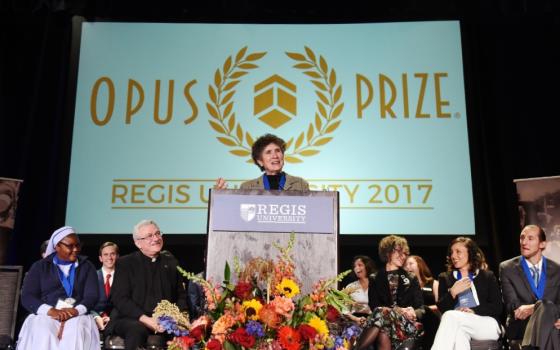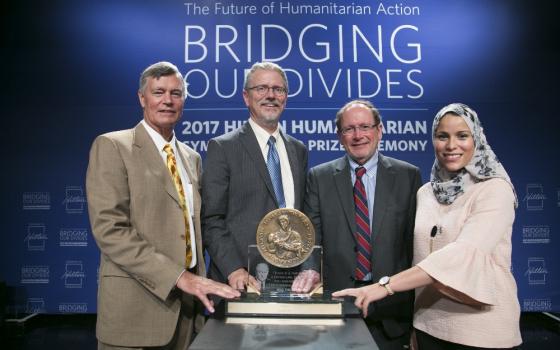Sometimes it is frustrating to report on humanitarian issues. You see the unfinished work and all that is left to be done: the hunger that still exists; the roads left unrepaired and buildings in shambles; the children who need more and better schools.
But there are moments when you can step back and say: OK, we have to take the long view, and that things will eventually get better in some of the toughest places on Earth. And that change is happening, often off the radar in an all-too-noisy world.
I've had that feeling twice in the last week.
The first was learning that Regis University in my hometown of Denver, Colorado, and the Minneapolis-based Opus Foundation awarded the Opus Prize to Mercy Sr. Marilyn Lacey, founder of Mercy Beyond Borders, a faith-based humanitarian group that focuses its work on improving the lives of women and girls in South Sudan and Haiti.
The award is backed up by a prize of $1 million — money that Regis said in a statement will allow Lacey "to endow more scholarships for her students, expand the reach of her programs and grow her staff to help even more women and girls in these impoverished and war-torn nations."
California-based Mercy Beyond Borders provides scholarships, micro-enterprise assistance and job training to some 1,400 women and girls annually but does so in a quiet way, well-earning the Opus Prize's dedication to recognizing "unsung heroes who are conquering the world's most persistent social problems." Educational scholarships are provided in both countries, with micro-enterprise programs in South Sudan and skills development training in Haiti.
"Lacey demonstrates a lifelong commitment to giving hope to those displaced by war and political forces with her decades of work with refugees around the world," Regis said of the award, announced Oct. 11.
Lacey framed the work of her organization in the context of a faith-based commitment.
"I felt called by God to help these women and girls who are suffering," Lacey said in a statement. "In serving others, we can find a connectedness, a kinship that leads to binding joy."
In an interview with GSR, Lacey said the award was totally unexpected, and did not follow the usual pattern of a small non-profit seeking funding from a foundation. "It came to us, goodness came to us. That was upside down in a way, but that has been my experience of God: surprising, unexpected, humbling. It is a great gift."
Lacey said that she believes education for girls and women will lead to peace in South Sudan and improve conditions in Haiti. She acknowledged the work in two countries facing serious problems is challenging. "But as a Sister of Mercy, you want to go where the need is greatest," she told me.
The annual prize itself is interesting: it is up to Catholic universities — this year it was Regis, a Jesuit institution — to determine possible prize winners and select finalists. A jury of community leaders, in this case based in Denver, selected the winner.
Lacey's work does not stand alone — one of the other finalists for the Opus Prize was Sr. Stan Terese Mumuni, founder of the Nazareth Home for God's Children in the West African country of Ghana. The home is a place of healing for children with mental, behavioral and physical disabilities.
Wider network of sisters in service
The faith-based work of Srs. Lacey and Mumuni is part of an even wider network of humanitarian groups throughout the world, and their efforts were honored last week in Los Angeles during an all-day symposium sponsored by the Conrad N. Hilton Foundation. (Global Sisters Report is a Hilton Foundation grantee.)
I was fortunate to attend the Oct. 11 symposium, the highlight being the awarding of the annual Conrad N. Hilton Humanitarian Prize, which is sometimes called the Nobel Prize of the humanitarian world. The $2 million award this year went to the International Centre for Diarrhoeal Disease Research, Bangladesh, which goes by the acronym icddr,b.
The organization is a public health research institution based in the Bangladesh capital of Dhaka that works on solutions to major global health challenges. In his remarks, Hilton Foundation President and CEO Peter Laugharn said, "For more than 50 years, icddr,b has been at the forefront of low-cost, innovative health solutions that have resulted in saving tens of millions of lives globally. icddr,b has had a profound impact on health crises and solutions worldwide, and has shown that innovation and breakthroughs can come from all parts of the globe."
The Hilton Foundation noted in a statement that developing countries "are not the first place people look to find a public health revolution." But icddr,b's facility "has served for decades as a global hub for cutting-edge research on enteric diseases." Though initially founded with a focus on fighting cholera and other diarrheal diseases, icddr,b has become the world's largest diarrheal hospital, Hilton noted, "treating more than 200,000 patients a year, almost all of whom recover within 36 hours."
Perhaps most notably, the foundation said, icddr,b's development of an oral rehydration solution, "which treats the symptoms of diarrheal disease connected to cholera, has saved tens of millions of lives."
It was moving to see an organization that has done so much good to be honored. Just as it was moving to realize that so many organizations like icddr,b — and not to mention groups like Mercy Without Borders — are doing their work without a lot of fanfare in a time of blaring self-promotion.
We certainly need such groups. U.N. High-Level Commissioner Dr. Alaa Murabit, a prominent advocate for the United Nations' Sustainable Development Goals, said at the Hilton symposium health care is going to become the "greatest concern of the 21st century" and that a focus on the interconnected issues of health, fighting serious diseases and eliminating poverty will be a cornerstone of the future.
Murabit noted the links between health care and religious faith, saying that hospitals are places "that have probably heard more prayers than anywhere else in the world." In a hurting world, it is up to nations and communities to nurture better health care and care for those living in poverty, she said. Put another way, she said, "It is up to us to redefine what security is."
One of the other speakers at the symposium, Clarence B. Jones, a former speechwriter and counsel to the Rev. Martin Luther King, Jr., called on the audience to reflect on the state of America's "moral compass" today.
"On some questions," Jones said, "my beloved brother [King] would say, 'There comes a time when one must take the position that is neither safe, nor politic, nor popular, but he must do it because conscience tells him it is right. I believe today that there is a need for all people of goodwill to come with a massive act of conscience.'"
"So again, I ask, tell me where again is our moral compass of America today?"
[Chris Herlinger is GSR international correspondent. His email address is cherlinger@ncronline.org.]


